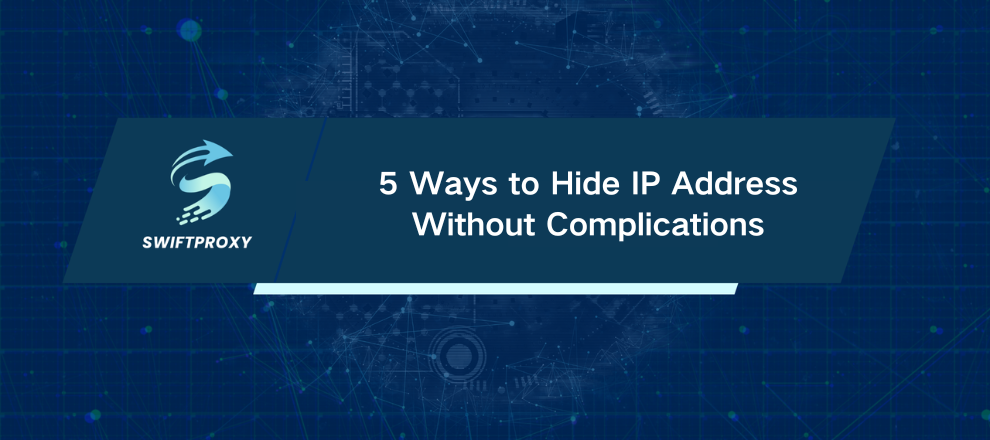5 Ways to Hide IP Address Without Complications
Every device connected to the internet carries a unique digital signature: its IP address. Billions of them exist worldwide, each one a breadcrumb leading back to you. That means anyone with the right tools can trace your location, see your Internet Service Provider (ISP), and sometimes even infer habits or personal details. Hiding your IP address isn’t about conspiracy—it’s about taking control of your online footprint. In this guide, we’ll show you what an IP address really reveals and walk you through five practical ways to stay private online.

Introduction to IP Address
An IP address is like your device's digital ID card. Assigned by your ISP, it tells the internet where to send data—whether that's a video, email, or web page. There are two main types: IPv4, the older format most sites still use, and IPv6, which offers a much larger pool of addresses.
Think of it as a home address for your online activity. Without it, you can't communicate with websites, servers, or apps. But just like your home address, exposing it publicly has risks. From your IP alone, someone could determine your city, region, even your ISP—and in some cases, track services running on your device.
So yes, IP addresses are necessary. But leaving them exposed? That's optional.
5 Methods to Hide Your IP Address
Not every method is perfect, and the best choice depends on your goals—whether you want to access restricted content, protect your privacy, or scrape data for legitimate business purposes. Let's break down your options.
1. Use a Proxy
A proxy server acts as a middleman between your device and the internet. When you connect through a proxy, websites only see the proxy's IP address, not yours.
Beyond privacy, proxies give location flexibility. Need to access content in Germany while sitting in the U.S.? A German residential proxy has you covered.
Proxies are especially useful for web scraping, where frequent requests could otherwise get your IP banned. If you're running data collection tasks online, proxies are often the most efficient solution.
2. Try a VPN
A Virtual Private Network (VPN) is the simplest, most secure way to mask your IP address. It routes your traffic through a remote server, hiding your real IP behind a dedicated, shared, or dynamic one.
The bonus? Encryption. VPNs create a secure tunnel that shields your browsing from prying eyes. Paid VPNs—think NordVPN or SurfShark—also undergo independent audits to confirm no-logs policies, something free VPNs often can't guarantee.
VPNs are versatile: they bypass geo-restrictions, encrypt traffic, and protect your activity from trackers. Downside? A minor slowdown in speed due to encryption. Worth it for the added security.
3. Use TOR
The TOR network is free, open-source, and highly anonymous. Your traffic bounces through multiple servers before reaching its destination, making it almost impossible to trace back to you.
TOR is perfect if complete anonymity is your goal—but expect slower speeds. It's ideal for privacy-first browsing or investigative research, but less suitable for streaming or scraping data efficiently.
For additional anonymity, combine TOR with private search engines like DuckDuckGo to prevent tracking of your searches.
4. Change Your Mobile Network
Here's a quick, often overlooked trick—use your mobile data. Each time you toggle your mobile network, you get a new IP address.
It's fast, convenient, and effective for short-term privacy, like avoiding targeted attacks. Just remember—mobile data isn't encrypted, can eat into your data plan, and may reduce speed. Use this as a tactical option, not a long-term solution.
5. Use Public Wi-Fi
Joining an open Wi-Fi network can mask your IP temporarily. The network assigns you a different IP, hiding your original one.
But remember that public Wi-Fi comes with security risks. Other users on the network could be malicious, and unsecured hotspots can expose your device to attacks. Use this method only in emergencies, and never for sensitive transactions.
Why Hide Your IP Address
There are several reasons to mask your digital identity:
Mask Your Location: Even without your full address, websites can estimate your city or region. Changing your IP gives you anonymity.
Bypass Restrictions: Some networks block content. A different IP lets you bypass limits without hassle.
Avoid IP Bans: Frequent web scraping or data requests can trigger bans. Rotating proxies or VPNs prevent disruptions.
Prevent Targeted Attacks: Hackers can't trace your real IP, reducing the risk of direct attacks.
Even more surprisingly, studies have shown that a single IP address can reveal browsing habits, interests, and even community participation—information you might not want public.
Should Companies Hide Their IP Addresses
It depends. Cybersecurity teams often mask IPs to safely monitor threats and conduct anti-phishing operations. But public-facing businesses, like e-commerce sites, rely on IPs for essential functions: website accessibility and email routing.
The compromise? Many companies hide the IP addresses of their servers using reverse proxies. This ensures that users interact with a secure front-end, while the real server IP remains concealed. For extra anonymity, some employ high-security proxies—but not all proxies are created equal, so careful selection is key.
Final Thoughts
Your IP address is more than a number—it's a digital footprint revealing who you are online. Protecting it isn't just about privacy; it's about control.
The most reliable solutions? Proxy servers and VPNs, with TOR, mobile networks, and public Wi-Fi serving specific needs. For businesses, reverse proxies provide a blend of visibility and security, keeping operations safe while maintaining functionality.
Choose the method that fits your goals. Then browse, stream, or work online with confidence—your digital footprint, your rules.

















































